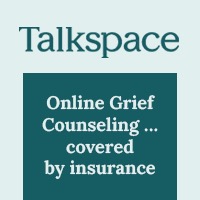Bereavement
Coping with the loss of a close friend or family member may be one of the hardest challenges that many of us face. When we lose a spouse, sibling or parent our grief can be particularly intense. Loss is understood as a natural part of life, but we can still be overcome by shock and confusion, leading to prolonged periods of sadness or depression. The sadness typically diminishes in intensity as time passes, but grieving is an important process in order to overcome these feelings and continue to embrace the time you had with your loved one.
Everyone reacts differently to death and employs personal coping mechanisms for grief. Research shows that most people can recover from loss on their own through the passage of time if they have social support and healthy habits. It may take months or a year to come to terms with a loss. There is no "normal" time period for someone to grieve. Don't expect to pass through phases of grief either, as research suggests that most people do not go through stages as progressive steps.
Grieving individuals may find it helpful to use some of the following strategies to help them process and come to terms with loss:
- Talk about the death of your loved one with friends or colleagues in order to help you understand what happened and remember your friend or family member. Avoidance can lead to isolation and will disrupt the healing process with your support systems.
- Accept your feelings. You may experience a wide range of emotions from sadness, anger or even exhaustion. All of these feelings are normal and it’s important to recognize when you are feeling this way. If you feel stuck or overwhelmed by these emotions, it may be helpful to talk with a licensed psychologist or other mental health professional who can help you cope with your feelings and find ways to get back on track.
- Take care of yourself and your family. Eating healthy foods, exercising and getting plenty of sleep can help your physical and emotional health. The grieving process can take a toll on one’s body. Make sure you check in with your loved ones and that they are taking the necessary healthy steps to maintain their health.
- Reach out and help others dealing with the loss. Spending time with loved ones of the deceased can help everyone cope. Whether it’s sharing stories or listening to your loved one’s favorite music, these small efforts can make a big difference to some. Helping others has the added benefit of making you feel better as well.
- Remember and celebrate the lives of your loved ones. Anniversaries of a lost loved one can be a difficult time for friends and family, but it can also be a time for remembrance and honoring them. It may be that you decide to collect donations to a favorite charity of the deceased, passing on a family name to a baby or planting a garden in memory. What you choose is up to you, as long as it allows you to honor that unique relationship in a way that feels right to you.
Grief Counselors
Individual counseling, local grief support groups, and online resources may prove helpful to you in managing the loss of a loved one. These include discussion forums, educational tools, and specific communities for people coping with grief. Here are a few, listed in alphabetical order:- Talkspace offers access to licensed, trained, experienced, and accredited psychologists (PhD / PsyD), marriage, family and teen therapists (LMFT), clinical social workers (LCSW / LMSW), and board licensed professional counselors (LPC).
- Chat-gpt.org is an online chat bot that people can use to record their loved ones voice and have simulated conversations with them after they die.
- Grieving.com is a forum resource with more than 45,000 active members. Topics range from terminal illness to the loss of a pet.
- Miss Foundation is a volunteer-run organization that supports people of all ages through the process of grieving the death of a child.
- Recover From Grief offers a wellspring of coping strategies.
- The Grief Toolbox features articles, an online art gallery, and a support group locator.
Death Doulas
A death doula, or death midwife, is a person who assists in the dying process, much like a midwife or doula does with the birthing process. It is often a community-based role, aiming to help families plan for and cope with death through recognizing it as a natural and important part of life.Typical cost: $200 - $400+
- Inelda offers a directory of end-of-life doulas to help support and guide you through the dying process.
- Doula Givers features certified end-of-life and elder care doula consultants, including TeleDoula services.
Death Cafés
Death Cafés are a part of a global movement to provide a relaxed and nurturing setting where you can join open, honest discussions to explore the questions you may have about life, dying and grief. Death Cafes are not-for-profit and there is no cost to attend one, although purchase of a coffee and snack are encouraged to fully partake in the experience. [NOTE: Death Cafes are not for bereavement support or grief counseling.]- To locate the nearest Death Cafe to you, visit this online directory.
Remember there is no right or wrong way to grieve. Make sure to take care of your needs both physically and emotionally.
If you have any questions, please contact us:
- By phone: (888) 802-0999, available 24/7. (Se Habla Español.)
- By email: [email protected]
- By chat: 7AM - 10PM Eastern Time, seven days a week; click on the round red chat button on the bottom right of the screen.
If you are in immediate need because a death has already occurred, order a direct cremation now. If a death is imminent (a matter of days or weeks), visit the Cremstar Cremation Cost Calculator for an estimate and to email yourself a customized "Order Now" link. If you are preparing for the future, visit our Planning Ahead section.

